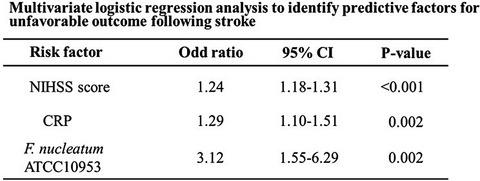当前位置:
X-MOL 学术
›
Clin. Exp. Immunol.
›
论文详情
Our official English website, www.x-mol.net, welcomes your
feedback! (Note: you will need to create a separate account there.)
Serum immunoglobulin G antibody titer to Fusobacterium nucleatum is associated with unfavorable outcome after stroke.
Clinical & Experimental Immunology ( IF 3.4 ) Pub Date : 2020-03-24 , DOI: 10.1111/cei.13430 H Nishi 1 , N Hosomi 2, 3 , K Ohta 4 , S Aoki 5 , M Nakamori 6 , T Nezu 5 , H Shigeishi 4 , T Shintani 7 , T Obayashi 1 , K Ishikawa 5, 6 , N Kinoshita 5 , Y Shiga 5 , M Sugiyama 4 , H Ohge 8 , H Maruyama 5 , H Kawaguchi 1 , H Kurihara 9
Clinical & Experimental Immunology ( IF 3.4 ) Pub Date : 2020-03-24 , DOI: 10.1111/cei.13430 H Nishi 1 , N Hosomi 2, 3 , K Ohta 4 , S Aoki 5 , M Nakamori 6 , T Nezu 5 , H Shigeishi 4 , T Shintani 7 , T Obayashi 1 , K Ishikawa 5, 6 , N Kinoshita 5 , Y Shiga 5 , M Sugiyama 4 , H Ohge 8 , H Maruyama 5 , H Kawaguchi 1 , H Kurihara 9
Affiliation

|
Stroke can be a cause of death, while in non-fatal cases it is a common cause of various disabilities resulting from associated brain damage. However, whether a specific periodontal pathogen is associated with increased risk of unfavorable outcome after stroke remains unknown. We examined risk factors for unfavorable outcome following stroke occurrence, including serum antibody titers to periodontal pathogens. The enrolled cohort included 534 patients who had experienced an acute stroke, who were divided into favorable (n = 337) and unfavorable (n = 197) outcome groups according to modified ranking scale (mRS) score determined at 3 months after onset (favorable = score 0 or 1; unfavorable = score 2-6). The associations of risk factors with unfavorable outcome, including serum titers of IgG antibodies to 16 periodontal pathogens, were examined. Logistic regression analysis showed that the initial National Institutes of Health stroke scale score [odds ratio (OR) = 1·24, 95% confidence interval (CI) = 1·18-1·31, P < 0·001] and C-reactive protein (OR = 1·29, 95% CI = 1·10-1·51, P = 0·002) were independently associated with unfavorable outcome after stroke. Following adjustment with those, detection of the antibody for Fusobacterium nucleatum ATCC 10953 in serum remained an independent predictor of unfavorable outcome (OR = 3·12, 95% CI = 1·55-6·29, P = 0·002). Determination of the antibody titer to F. nucleatum ATCC 10953 in serum may be useful as a predictor of unfavorable outcome after stroke.
中文翻译:

具核梭杆菌的血清免疫球蛋白 G 抗体滴度与中风后的不良结果相关。
中风可能是死亡原因,而在非致命病例中,中风是相关脑损伤导致各种残疾的常见原因。然而,特定的牙周病原体是否与中风后不良结果的风险增加相关仍不清楚。我们检查了中风发生后不良结果的危险因素,包括牙周病原体的血清抗体滴度。入组队列包括 534 名经历过急性中风的患者,根据发病后 3 个月确定的改良排名量表 (mRS) 评分,将他们分为有利 (n = 337) 和不利 (n = 197) 结果组(有利 =得分 0 或 1;不利 = 得分 2-6)。检查了危险因素与不良结果的关联,包括针对 16 种牙周病原体的 IgG 抗体的血清滴度。 Logistic 回归分析显示,初始美国国立卫生研究院卒中量表评分 [比值比 (OR) = 1·24,95% 置信区间 (CI) = 1·18-1·31,P < 0·001] 和 C -反应蛋白(OR = 1·29,95% CI = 1·10-1·51,P = 0·002)与中风后的不良结果独立相关。经过这些调整后,血清中具核梭杆菌 ATCC 10953 抗体的检测仍然是不良结果的独立预测因子(OR = 3·12,95% CI = 1·55-6·29,P = 0·002)。血清中具核梭菌 ATCC 10953 抗体滴度的测定可用作中风后不良结果的预测因子。
更新日期:2020-03-10
中文翻译:

具核梭杆菌的血清免疫球蛋白 G 抗体滴度与中风后的不良结果相关。
中风可能是死亡原因,而在非致命病例中,中风是相关脑损伤导致各种残疾的常见原因。然而,特定的牙周病原体是否与中风后不良结果的风险增加相关仍不清楚。我们检查了中风发生后不良结果的危险因素,包括牙周病原体的血清抗体滴度。入组队列包括 534 名经历过急性中风的患者,根据发病后 3 个月确定的改良排名量表 (mRS) 评分,将他们分为有利 (n = 337) 和不利 (n = 197) 结果组(有利 =得分 0 或 1;不利 = 得分 2-6)。检查了危险因素与不良结果的关联,包括针对 16 种牙周病原体的 IgG 抗体的血清滴度。 Logistic 回归分析显示,初始美国国立卫生研究院卒中量表评分 [比值比 (OR) = 1·24,95% 置信区间 (CI) = 1·18-1·31,P < 0·001] 和 C -反应蛋白(OR = 1·29,95% CI = 1·10-1·51,P = 0·002)与中风后的不良结果独立相关。经过这些调整后,血清中具核梭杆菌 ATCC 10953 抗体的检测仍然是不良结果的独立预测因子(OR = 3·12,95% CI = 1·55-6·29,P = 0·002)。血清中具核梭菌 ATCC 10953 抗体滴度的测定可用作中风后不良结果的预测因子。











































 京公网安备 11010802027423号
京公网安备 11010802027423号